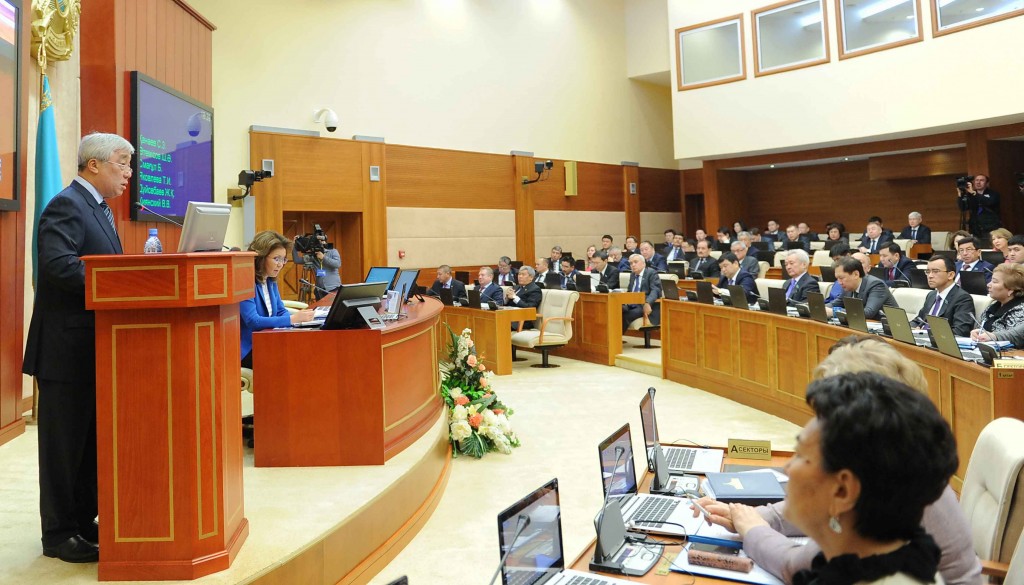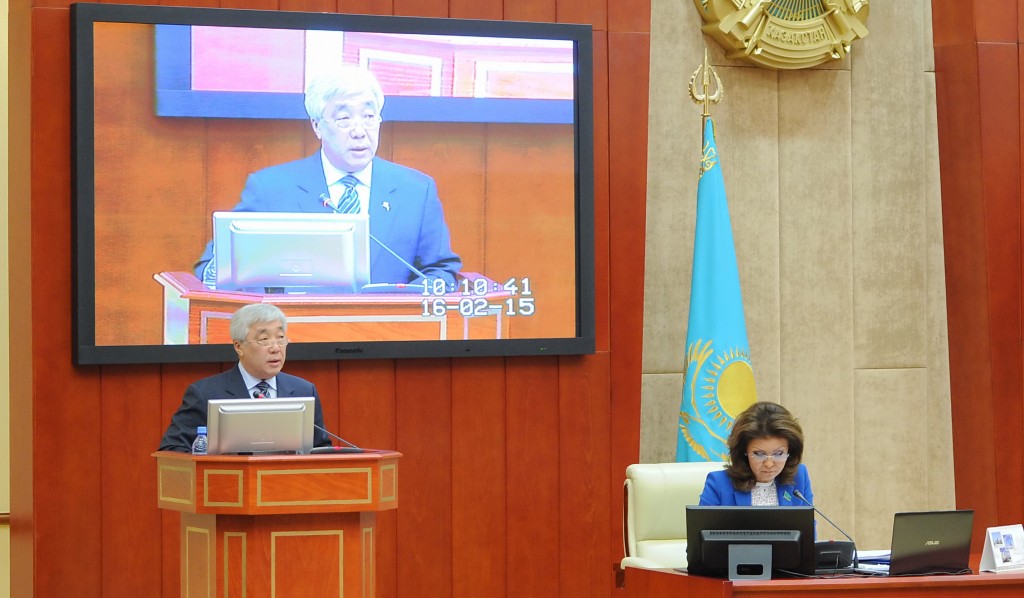ASTANA – Foreign Minister Erlan Idrissov presented a report regarding implementing Kazakhstan’s Concept of Foreign Policy for 2014-2020 during the Feb.16 Mazhilis (lower house of Parliament) government hour.

During the session that actually lasted slightly more than two hours, Idrissov emphasised that recent world events indicated “a radical change in the geopolitical environment and the system of international relations. The decrease of the sustainability and efficiency of regional and international security systems has deepened.”
The minister highlighted that the geopolitical confrontationbetween Russia andthe West over Ukraine was areal challengefor the entireinternational legal system. He confirmed Kazakhstan’s positionas an advocate fora balanced approach on the basis of fundamental principlesof international law.
“We are interested in a stable, independent and territorially-integral Ukraine,” he added.
The country assisted in an Aug. 26 meeting in Minsk of the presidents of Kazakhstan, Russia, Belarus and Ukraine and the EU high representative, which resulted in re-launching the so-called “Normandy Four” process of peaceful settlement, establishing direct dialogue between the parties and signing the Minsk Agreement.
“President Nazarbayev revived the Normandy Four negotiation format and as a result a few days ago, on Feb. 11-12, Minsk hosted a meeting of the leaders of Russia, Ukraine, Germany and France. By the end of the 16-hour negotiations, the parties agreed to a ceasefire beginning Feb. 15 and the withdrawal of heavy weapons,” said Idrissov, as he explained concern for the situation on the ground in south-eastern Ukraine which saw sporadic violations of the ceasefire agreement, especially around the crucial railway hub of Debaltseve.
“One of the nuances within the process of the settlement of the Ukrainian conflict is a policy of establishing a dialogue between the European Union and the Eurasian Economic Union,” Idrissov highlighted.
2014 also became a milestone for the world market of hydrocarbons and pipeline projects, with oil prices falling by more than 50 percent. Major routes of natural gas supplies have undergone transformations, Idrissov told the members of the Mazhilis adding that Kazakhstan had a clear strategy of overcoming adverse affects of the situation on its economy including through the Nurly Zhol – Path to the Future new economic programme.
The world map of trade relations has also changed. Of significant importance was the signing of an agreement May 29 in Astana by the presidents of Kazakhstan, Belarus and Russia to establish the Eurasian Economic Union. The union, created on the initiative voiced in 1994 at Moscow State University by Kazakh President Nursultan Nazarbayev, started operation Jan. 1 and now also includes Armenia which formally joined on Jan. 2. The neighbouring Kyrgyzstan is set to join in May 2015. Nevertheless, Idrissov added that “the entry into force of the treaty on the EAEU is only a beginning of the hard work to establish it.”
“I want to emphasise that the course toward the Eurasian economic integration is a strategic choice of our country. Amid the global turbulence, economic integration is an objective trend and a natural phenomenon. No country can develop without integrating the economy and our economy needs new markets and the removal of barriers to trade and investment,” Idrissov stressed, adding that Kazakhstan was also determined to develop other directions of foreign policy.
Thus last year, Astana successfully completed negotiation processes with the European Union on a new agreement on enhanced partnership and cooperation and Kazakhstan’s accession to the World Trade Organisation (WTO). The minister expressed hope that this year the country would sign a new agreement with the EU advancing cooperation in 29 areas, including easing the visa regime, one of the priority issue of Kazakhstan’s foreign policy.
Elaborating on Kazakhstan’s plans, Idrissov paid special attention to transitioning to the green economy, particularly in the context of preparations for the international exhibition EXPO 2017. Answering questions from the audience, he stated that Kazakhstan was ready to “provide financial and logistic support to up to 60 developing countries” to help them with participating in the exhibition.
Addressing issues of global and regional security, the minister underlined that Kazakhstan called for the comprehensive strengthening of the United Nations as a universal organisation designed to address issues of war and peace and sustainable development. An important focus of Kazakhstan’s activities was to promote its candidacy as a non-permanent member of the UN Security Council in 2017-2018, which would attract international attention to the problems of the region such as the fight against terrorism, drug trafficking, energy and food security, water and energy issues, non-proliferation and others.
“We have already gained support from 100 states. However, this doesn’t mean that we can relax. We will continue working until the election hour,” the minister declared, explaining that Kazakhstan’s competitor in this bid process is Thailand.
In respect to regional security, Idrissov noted the results of the fourth summit of the Conference on Interaction and Confidence-Building Measures in Asia (CICA) in Shanghai in May 2014, which saw the signing and approval of the memorandum of understanding between the Shanghai Cooperation Organisation (SCO) and the CICA Secretarial and the new CICA rules of procedure. Currently, Kazakhstan continues consultations with its partners to create an Organisation for Security and Development in Asia on the basis of the CICA. Idrissov noted that the Chinese chairmanship in CICA gave good ground for optimism that CICA would continue to develop and strengthen as an influential forum.
Referring to nuclear security, Idrissov emphasised signing the protocol to the agreement on establishing a nuclear-weapons-free zone in Central Asia (CANWFZ). The document was inked in New York by representatives of the five nuclear powers, China, France, Russia, the United Kingdom and the United States. He also stressed Kazakhstan’s commitment to promoting the successful completion of negotiations on the Iranian nuclear programme and readiness to host another round of talks, if necessary.
Idrissov underlined that among Kazakhstan’s foreign policy achievements were accession to the Asia-Europe Forum (ASEM), a unique intercontinental multilateral platform comparable in importance with the Organisation for Security and Cooperation in Europe and CICA in Asia, and promotion of the Islamic Organisation for Food Security with headquarters in Astana.
Another big success was the Dec.10 presidential signing of the Kazakh law on official development assistance, which confirmed the country’s role as a regional leader and the emerging donor state in the Commonwealth of Independent States (CIS). “Establishing of the system of official development assistance KazAID is a reflection of a new status of the state,” the minister said. He explained that Kazakhstan, given the economic development it has experienced over the past several years has indeed moved up from the category of recipients of foreign aid to the group of donors and it has become necessary for the country to “share the burden of contributing to resolving regional and global issues.” The creation of the KazAID agency, which is set to focus initially on Kazakhstan’s neighbourhood, is one step in this direction, he explained.
In this context, Kazakhstan also continues to work on the formation of a regional UN hub in Almaty to promote addressing the urgent issues in the region and pragmatic cooperation with OSCE.
Another strategic direction of the foreign policy was establishing the legal status of the Caspian Sea. In this respect, Idrissov highlighted the outcomes of the Sept. 29 Caspian Summit in Astrakhan, the final documents of which reflected the main aspects of the Caspian states interaction on security and stability, military construction and military activities at sea, waters of differentiation, seabed and subsoil of the Caspian Sea, navigation regime, right to free access to the oceans and protecting the environment and marine scientific research at sea.
“We set very ambitious goals to sign a convention on the legal status of the Caspian seas at the summit in Astana in 2016,” he said, underlining that Kazakhstan has also been working on demarcating its land borders in accordance with international law.
Concluding his address, Idrissov answered a number of questions from the audience concerning election to the UN Security Council, gender policies in the Foreign Ministry and signing an agreement with International Atomic Energy Agency on establishing a bank of low enriched uranium.
He stated that 2015 promises to be eventful for foreign policy as Kazakhstan has assumed the CIS chairmanship. The year will also celebrate a number of anniversaries of international scale, including the 70th anniversary of victory in World War II and founding of the United Nations and state commemorations such as the 550th anniversary of the formation of the Kazakh Khanate and 20th anniversary of the Kazakh Constitution and Assembly of the People of Kazakhstan.
Concluding the session, Deputy Speaker of the Mazhilis Dariga Nazarbayeva commended the address of the minister and the cooperation between the ministry and the members of Parliament generally, stating: “We had a constructive discussion and I guess my only comment is to increase women’s representation [at the top ranks in the diplomatic service].”


